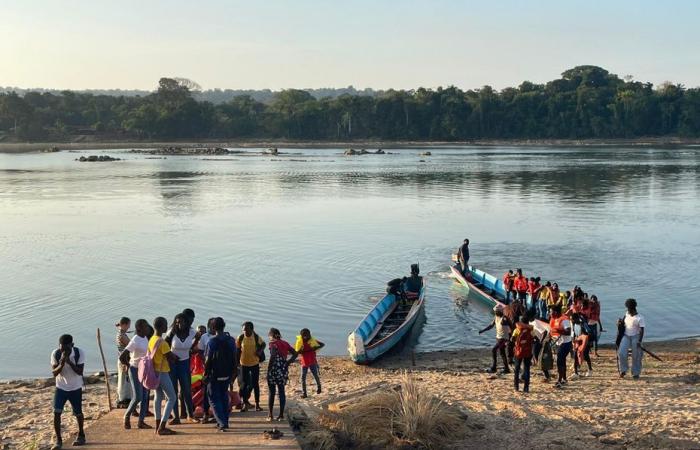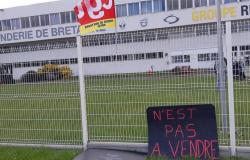The drought impacts the river communities and in particular the schools. In Papaïchton, students from Loca and Boniville take longer to join the college. In the classrooms, it is sometimes up to 40 degrees. Sometimes the water and electricity are cut off. The school nurse, teachers and principal are mobilized to keep the school open.
The sun has not yet risen on the Maroni. It is 6 a.m. when the students from Loca board the canoes which take them to the Papaichton college. The river level is low.
•
©Laura Philippon
“It happens that the canoe leans a lot, sometimes we get stuck in the stones, we are afraid”says Sybella, a 3rd grade student at Papaichton middle school.
Of the 228 school students, 65 come every morning by canoe from Loca and Boniville. Like her comrades, Sybella sees the river level drop every day. Before, it took around forty minutes to reach the school from Loca, it now takes almost an hour by canoe.
•
©Laura Philippon
The drought also means very hot weather in college classrooms. “In the afternoon the students fall asleep because it is so hot, there are also frequent power cuts and the fans stop so it is very hot”says Ahamada Saindou, professor at Papaichton college.
•
©Laura Philippon
The power cuts in the village are due to difficulties in supplying fuel which also no longer arrives by canoe to the village. “Sometimes we have to leave the class with the students to get some fresh air outside, it’s hellish” continues the professor.
In the next room, Stéphanie Trouilloud, a teacher, is giving assessments to the middle school students. “With this heat, the students' concentration is limited, we cannot teach normally, we cannot ask them the same thing, so we adapt the work according to the times of the day”she explains.
•
©Laura Philippon
For the principal of the college, the objective is to do everything to remain open and continue to welcome students despite the difficulties. “We must ensure education and the public service mission, as long as we have water, we can accommodate the students, but when the cuts last too long we are forced to send them home,” explains the principal. On the other hand, if the college were no longer supplied with water at all, we would be forced to close or take measures to restrict the establishment's hours.”
•
©Laura Philippon
At home too, students must adapt to water cuts from 8 p.m. to 6 a.m. throughout the village. At middle school, Tania Cabos the school nurse encourages them to drink lots of water when they can. “They need to hydrate because some complain of headaches,” explains the nurse. Dirt and dust are also increasingly causing respiratory problems. Students have asthma ».
•
©Laura Philippon
To date, the situation is still manageable to keep the college open, assures the principal. Unlike Grand Santi where the college is threatened with closure because canoeists can hardly travel on the river.
The schools of Antecume-Pata and Pidima have already been closed.
The heads of Maroni educational establishments participate every morning in crisis meetings with the rectorate.
•
©Laura Philippon
If the transport by canoe of the 65 students from Loca and Boniville were to stop, the principal of the Papaichton college is already preparing solutions. “Pedagogical continuity, already experienced in 2020 with Covid, could be put back in place, either remotely or by sending homework through the mail”explains the principal. He is also considering relocating courses and teachers to Loca.
According to him, everything must be done to ensure that students continue their education despite the consequences of the drought.






